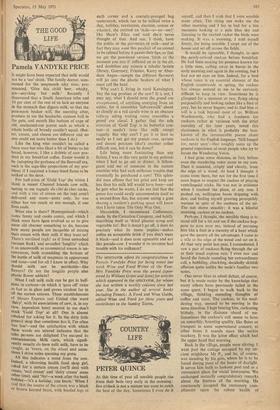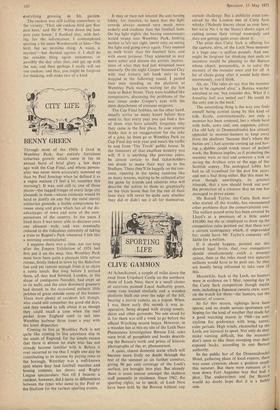PETER QUINCE
At this time of year all sensible people rise from their beds very early in the morning: five o'clock is not a minute too soon to catch the best of the day. Sometimes I even do it myself, and then I wish that I were sensible more often. The rising sun woke me the other morning and I lay in bed for a few moments looking at a pale blue sky and listening to the excited racket the birds were making. It was a morning, I told myself firmly, for being sensible. I crept out of the house and set off across the fields.
It would be agreeable, I thought, to spot the newly-arrived cuckoo before breakfast. He had been making his presence known for a little time, calling away in bursts in the early morning and again in the evening, but I had not set eyes on him. Indeed, for a bird whose voice is an essential element of the English countryside in spring, the cuckoo has always seemed to me to be curiously difficult to keep in view. Sometimes he is glimpsed for a moment or two, flying along purposefully and looking rather like a bird of prey, but he never lingers; and to find him at will is a task beyond most of us. William Wordsworth, who had a fondness for cuckoos rather at variance with the strict morality of his later years, noted this elusiveness in what is probably the best- known of the innumerable poems about cuckoos in the English language. 'Still longed for, never seen'—that roughly sums up the general experience of most people who try to locate the Wandering Voice.
1 had gone some distance, in fact, before even the wandering voice came to my ears. Then it sounded, crisply and clearly, from the edge of a wood. At least I thought it came from there, but not for the first time I soon began to suspect the cuckoo of playing ventriloquial tricks. He was not in evidence when I reached the place, at any rate. I pushed on, wellington boots dripping with dew, and feeling myself growing perceptibly warmer in spite of the coolness of the air. The sun shone steadily: it was a blissful morning, cuckoo or no cuckoo.
Perhaps, 1 thought, the sensible thing is to stand still for a bit and see if the cuckoo hap- pens to pass near me, instead of pursuing him like a fool in a travesty of a hunt which gave the quarry all the advantages. I came to a stile at the edge of the wood and sat on it. At that very point last year, I remembered, I saw a pair of cuckoos flying through the air at their usual express rate; I even saw and heard the female sounding her extraordinary call, a bubbling, chuckling, decidedly skittish effusion quite unlike the male's familiar two notes.
One never likes to admit defeat, of course, but it is made easier by the knowledge that many others have previously failed in the same quest. I began to walk back to the village, thinking consoling thoughts of coffee and toast. The cuckoo, in his mad- dening way, seemed to be moving in the same direction. I kept hearing him, cuckooing blithely, in the distance ahead of me. Sometimes the cuckoo's call seems to have an unearthly, haunting quality, like flutes or trumpets in some supernatural concert; at other times it sounds more like urchin mockery. It was the latter effect which had the upper hand that morning.
Back in the village, people were stirring. I went past the cottage occupied by my an- cient neighbour Mr P., and he, of course, was standing by his gate, where he is to be found during most of the hours of daylight. It serves him both as lookout post and as a convenient place for social intercourse. We exchanged mutually congratulatory remarks about the fineness of the morning. He courteously accepted the customary com- pliments upon the robust health of
everything growing in his garden: The cuckoo was still calling somewhere in the vicinity. 'That old cuckoo bird just flew past here,' said Mr P. 'Went down the lane past your house.' 1 thanked him, with feel- ing, for the information. I contemplated quoting a bit more Wordsworth at him—'No bird, but an invisible thing, A voice, a mystery'—but decided against it. I shall do the sensible thing again tomorrow, or possibly the day after that, and get up with the sun, and then perhaps 1 really will see our cuckoo; and that, you might be forgiven for thinking, will make two of a kind.







































 Previous page
Previous page